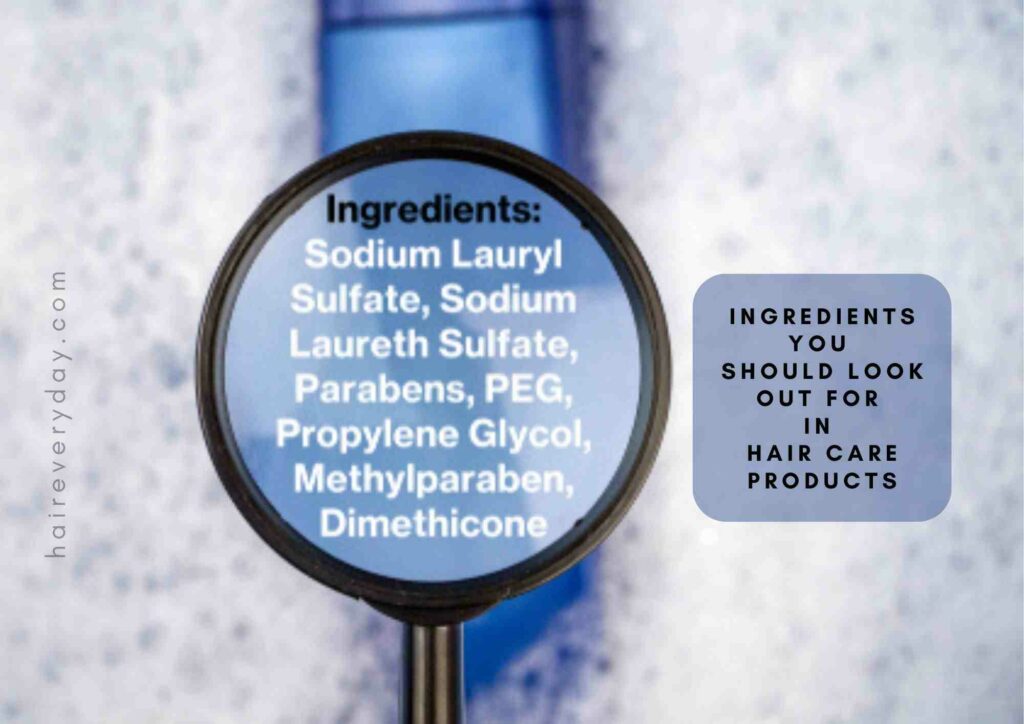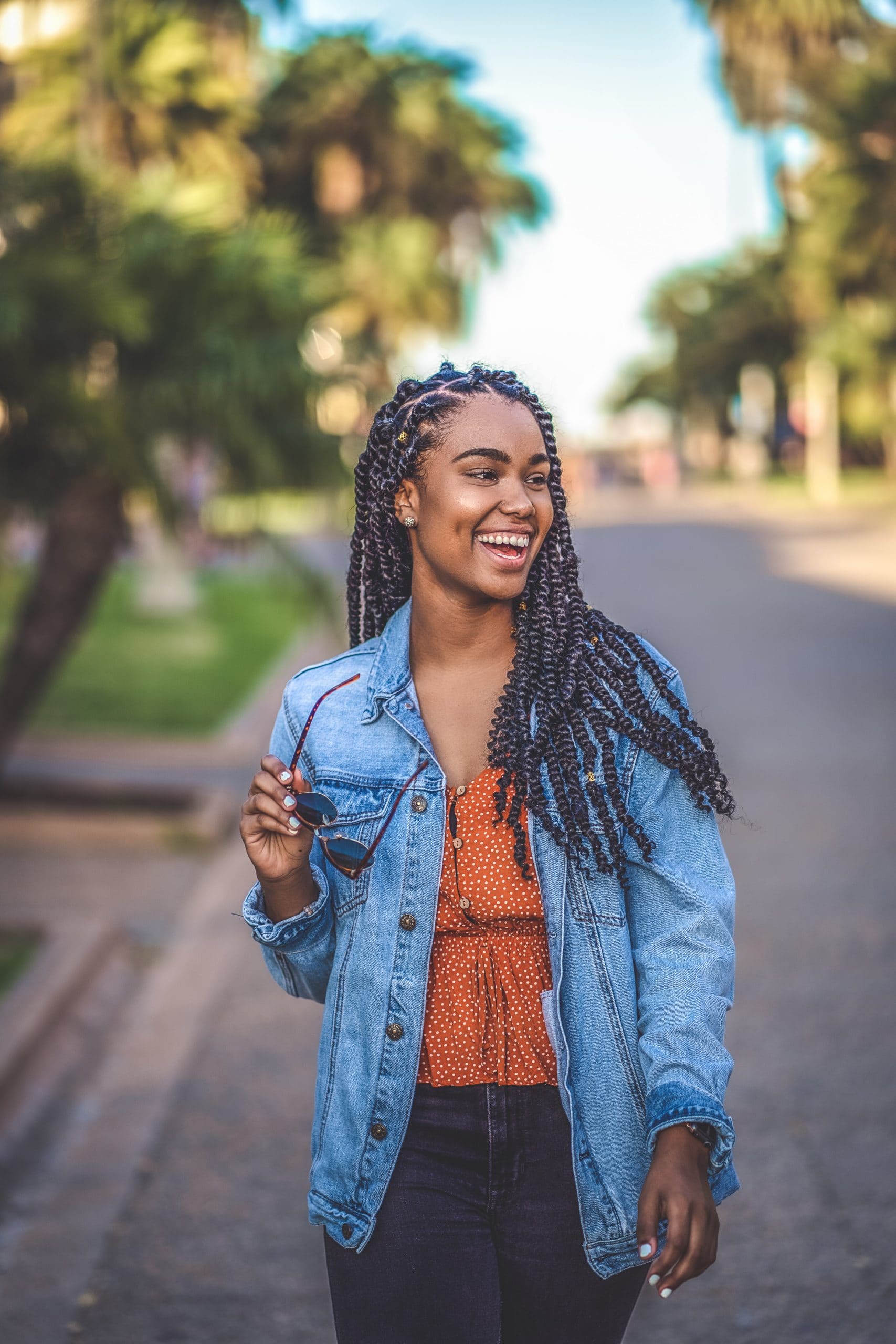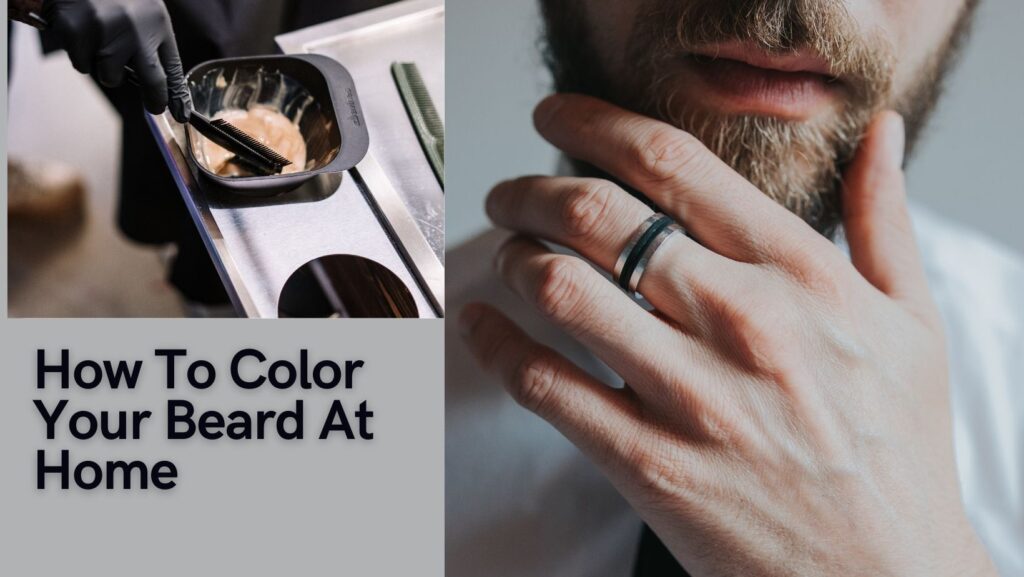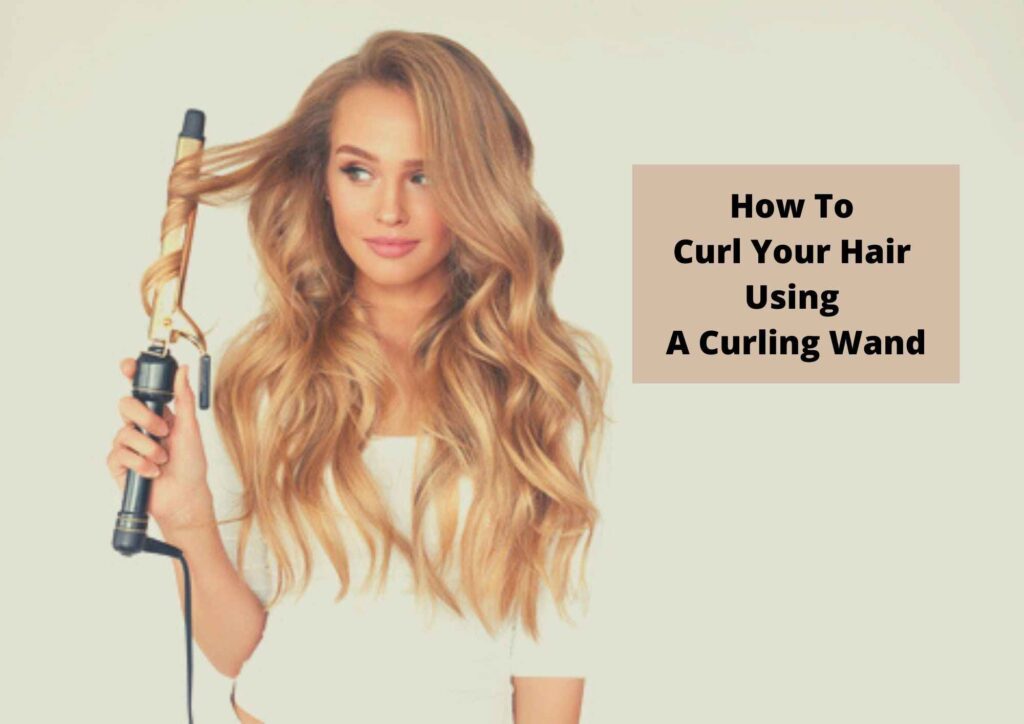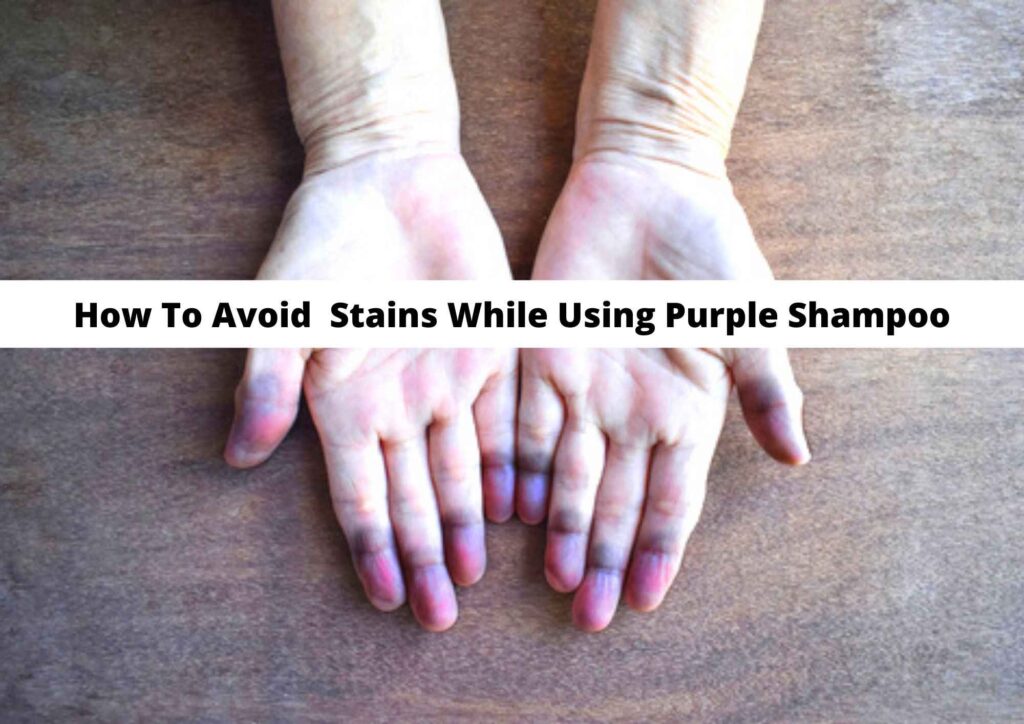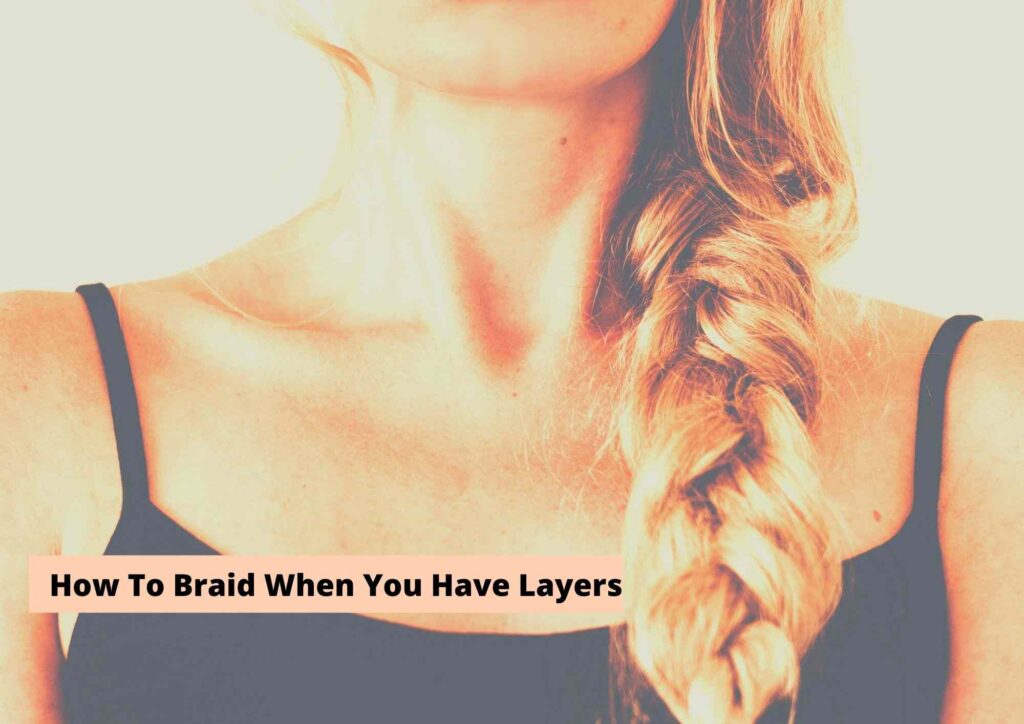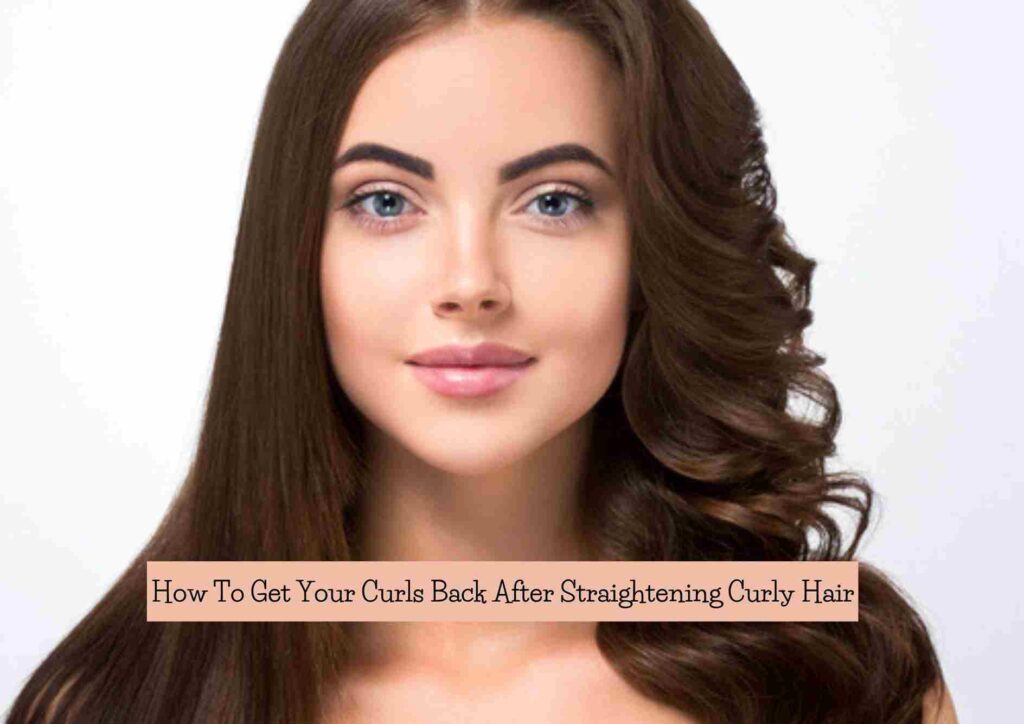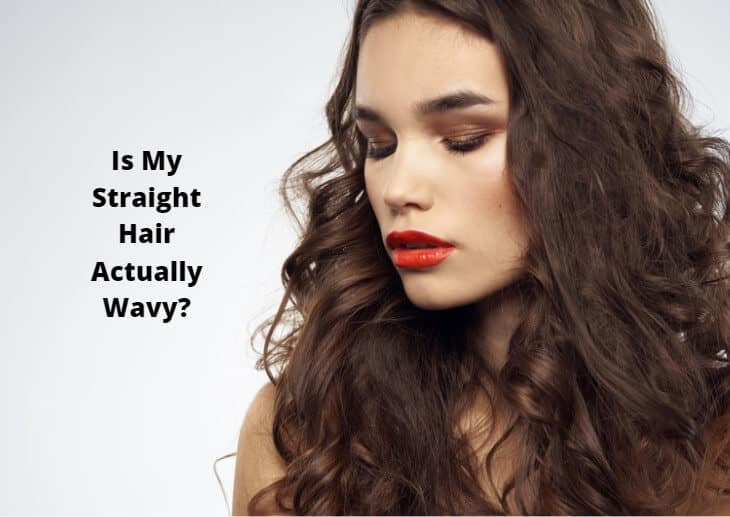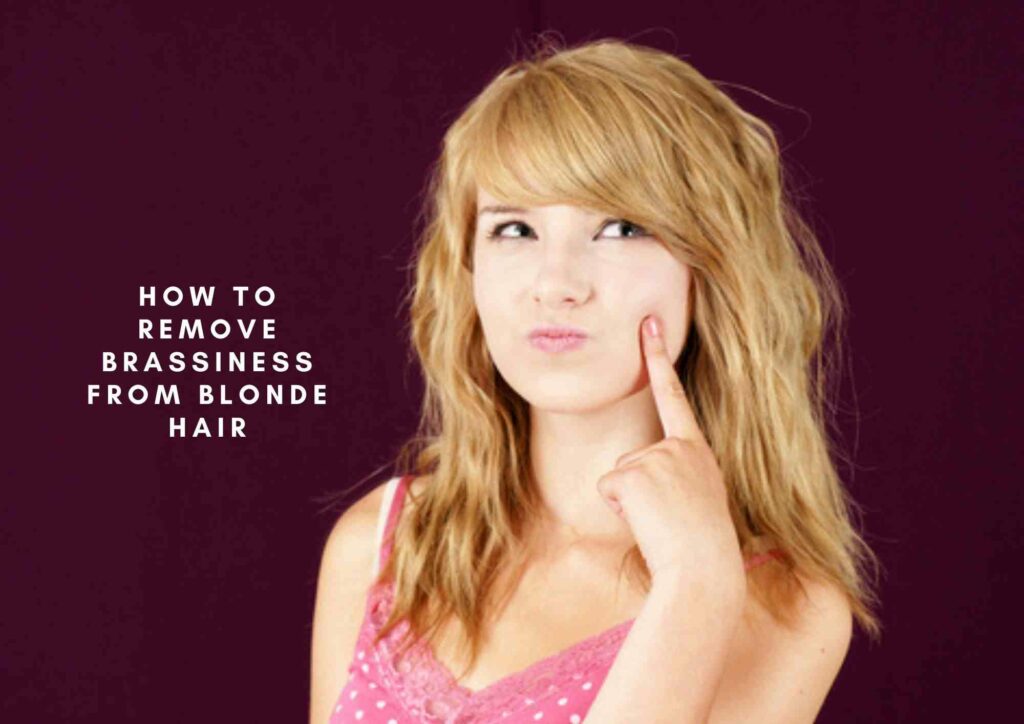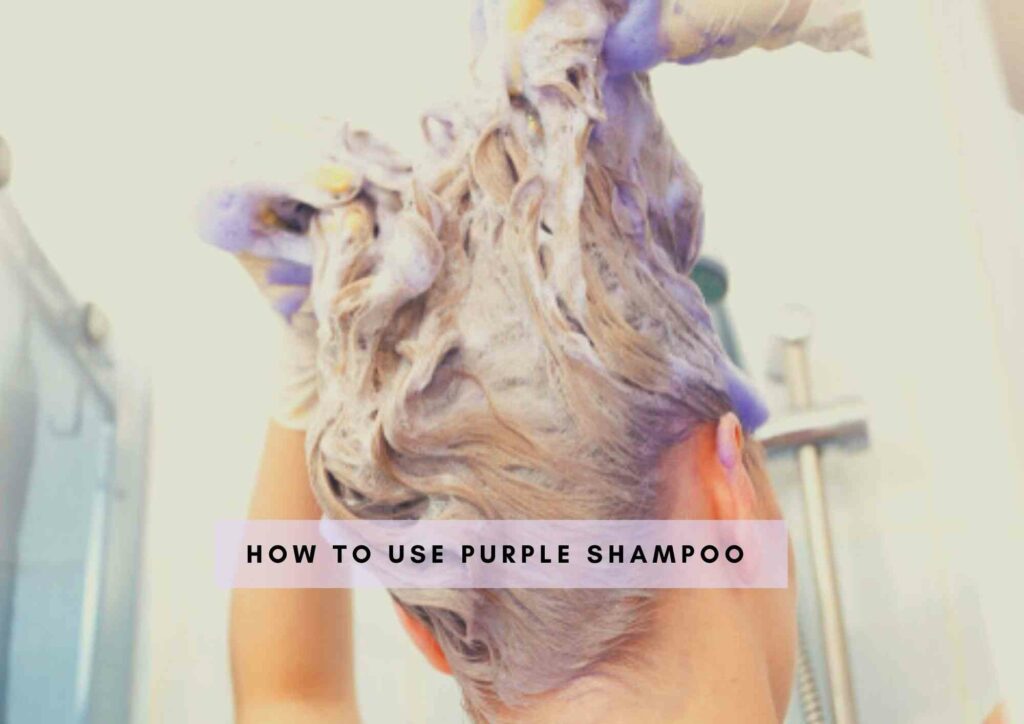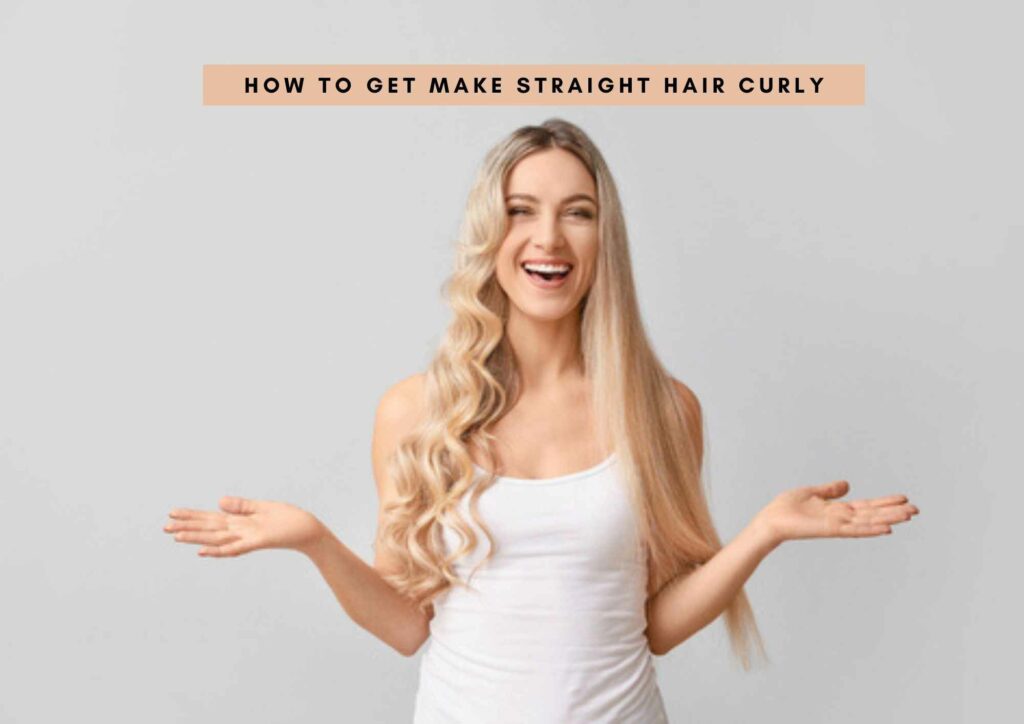These are ingredients to avoid in hair care. Here is my hair care ingredients checker that includes neurotoxins in shampoo, conditioners and other hair products.
Most of us use commercial hair care products like shampoos, conditioners, moisturizing creams, serums, gels, pomades, hair waxes and many more.
While some of these may work wonders on our hair and make the hair feel super smooth and silky, or maybe help us hold our hairstyles in place, we often do not realize how drastically damaging some of the ingredients in these hair care products are for our hair.
Looks like we need to seriously rethink whether these products are actually meant for hair “care”?
Here is my list of a few ingredients to avoid in hair care products like shampoos and conditioners.
Some of these ingredients are outright toxic for your health and others simply cause issues like buildup or dryness. Check it out!
Ingredients to Avoid in Hair Care
If you’re buying shampoos and conditioners and other hair care products, here is a list of ingredients you need to avoid.
1. Sulfates
Shampoos are products that are used for the purpose of cleansing, but even though effective, one of the most harmful cleansing ingredients are sulfates.
Sulfates of two types namely sodium laureth sulfate (SLES) and sodium lauryl sulfate (SLS) are used in shampoos and this is how you find your shampoo lathering well.
They cleanse the hair off its dirt, grime and other buildup and also make the hair feel softer, temporarily, while on the flip side, it can strip the hair off all its moisture in the long run and dry the hair out.
Words to look out for on product labels: Sulfates, sodium lauryl sulfate or SLS, sodium laureth sulfate or SLES.
2. Phthalates
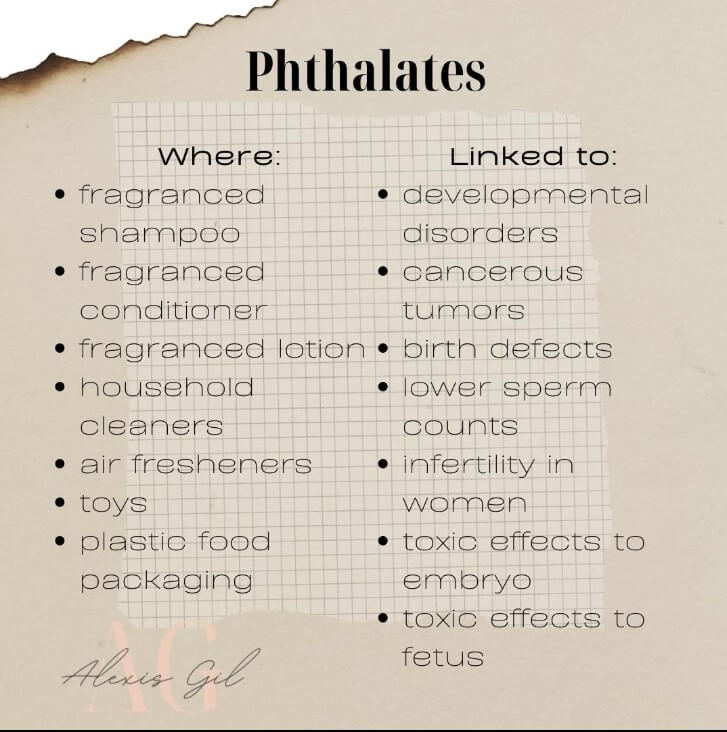
Phthalates are chemical substances used in hair care products like shampoos, hair gels, mousses, pomades, conditioners etc, because they are known to gel up very easily.
One of the main reasons the ingredient phthalates are added into a hair care product is more to help the other substances work better.
It will make the hair care product spread easily and evenly all over our hair, with a better and enhanced absorbing power.
These phthalates are also added to enhance the effect of the fragrances in the hair product, but it can often lead to skin irritation, asthma and cause allergic reactions on the skin.
Words to look out for on product labels: Fragrances, DCP, DEHP, SNOP, BzBP, DiNP and such words including those ending with – phthalate.
3. Parabens
Parabens are preservative ingredients used to increase the shelf life of a product. These parabens are harsh chemicals and very easily absorbed into the skin through the pores.
It can cause scalp skin irritation and may also lead to hair loss. Once these parabens enter into the body, they can also cause cancer and hormonal problems.
Some manufacturers do not use parabens, but use a less harsh ingredient called potassium sorbate, which is also harmful for the body.
Words to look out for on product labels: Isobuytlparaben, ethylparaben, methylparaben, propylparaben, butylparaben or potassium sorbate.
- Related: Under-Rated Natural Ingredients For Hair
- Related: What Are Surfactants In Hair Care
- Related: Does Custom Shampoo Work
4. Alcohol
The fact is that there can be different types of alcohol added to your hair care products, but not all types are bad for the hair.
Short-chain type of alcohol are those that are bad for the hair as they can leave the hair very dry, stripping away all the hair’s moisture. They penetrate easily into the hair shaft and tend to make the hair frizzy.
Some types of alcohol are added to help enhance the absorbance of other ingredients present in the shampoos and conditioners and also increase the spreadability of the hair care product in use.
Words to look out for on product labels: Isopropyl alcohol, benzyl alcohol, ethanol alcohol, propanol alcohol, alcohol denat. etc.
5. Triclosan
Triclosan is often used as an antibacterial ingredient in shampoos, to help protect the scalp from infections.
But it is important to know that triclosan is a carcinogen (a substance which has cancer-causing capabilities) and can have other effects on the hair including hair loss, scalp inflammation and dryness of hair.
Words to look out for on product labels: triclosan, lexol 300, triclocarban or cloxifenolum.
6. Silicones
Silicones are ingredients often found in conditioners and conditioning products because of their emollient properties. They help trap moisture in the hair by coating the hair shafts.
But when the hair shafts get constantly coated, over time, the hair becomes greasy and covered in a film that doesn’t let any other external moisture or products enter into the hair strand, eventually drying the hair out.
Since it coats the hair, it will weigh down the hair over time as it doesn’t wash off very easily with water.
Words to look out for on product labels: Dimethicone, ceteraryl methicone, cyclomethicone, amodimethicone, sterayl methicone and such words including those ending with – cone.
7. Formaldehyde
Most often called as a “human carcinogen”, formaldehyde is also known to be a preservative used in hair care products like shampoos and also in hair straightening products.
Formaldehyde is usually added to hair care products directly, but sometimes it also gets released by other ingredients over time.
This ingredient gets very easily absorbed into the skin and can cause allergic reactions. It can also be a cause for hair loss in the long run and has also been known to cause scalp burns.
Words to look out for on product labels: Glyoxal, quaternium-15, diazolidinyl urea, bronopol, etc.
8. Diethanolamine (DEA) and Triethanolamine (TEA)
Diethanolamine (DEA) and Triethanolamine (TEA) are used as foaming agents in shampoos and also act as emulsifiers. Hair care products contain both water-soluble and oil-soluble ingredients and hence require blending.
Therefore, the ingredients diethanolamine and triethanolamine are added. These ingredients help maintain the pH balance of the product.
These ingredients are very easily absorbed into the skin and are known to cause skin irritation and could also lead to cancer in the long run.
Words to look out for on product labels: Diethanolamine (DEA) and Triethanolamine (TEA).
9. Sodium Chloride
Do you wonder how your shampoos and conditioners get a thick consistency? Well, it’s all thanks to the sodium chloride or salt that is added to it.
But using sodium chloride on the hair can tend to make the hair very dry over time and it can also lead to scalp itchiness and hair fall in the long run.
Apart from being thickening agents, sodium chloride can also be used as a cleansing agent.
Words to look out for on product labels: Sodium chloride or salt.
10. Mineral Oils and Petrolatum
Mineral oils are often added to hair care products because they act as lubricating and moisturizing agents that can help moisturize the hair, reduce tangling of hair and prevent hair breakage.
But this ingredient can lead to skin irritation and can cause acne in some cases.
Also, many hair care products, especially hair styling products contain petrolatum or petroleum jelly because it helps keep the hair soft and makes it look smooth and shiny.
But this ingredient is similar to mineral oil and can coat the hair strands and can clog the pores on the scalp.
Words to look out for on product labels: Petroleum, mineral oils, liquid paraffin, petroleum, petroleum jelly.
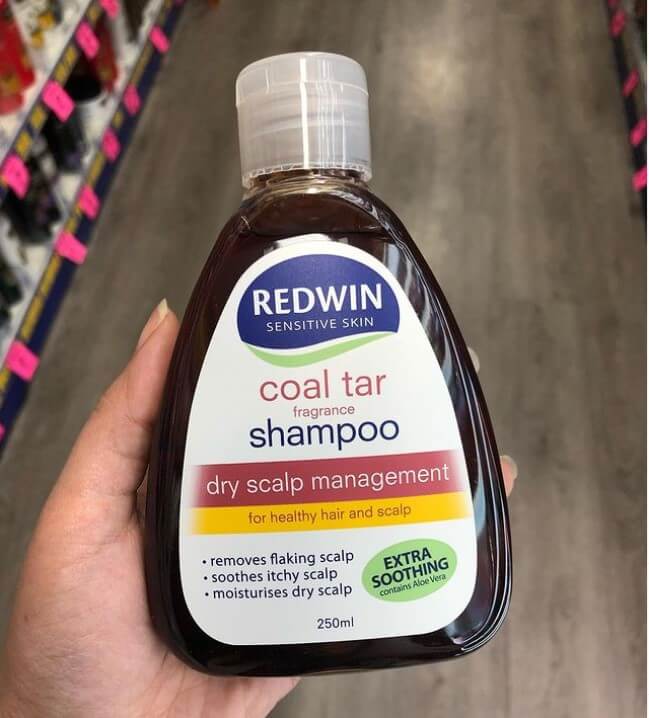
11. Coal Tar
This is a lesser known ingredient that most people do not often consider.
Coal tar is often used in shampoos that are meant for curing and preventing dandruff and other skin conditions like eczema and seborrheic dermatitis.
But the ingredient coal tar is bad for the hair and can make the hair very sensitive to sunlight. It is also known to cause other issues like folliculitis, skin rash and skin irritation.
Words to look out for on product labels: C.I., P-phenylenediamine, FD&C or D&C.
12. Cationic Surfactants
Similar to silicones, cationic surfactants are ingredients that are often found in hair conditioners and are meant to coat the hair and act as a protective layer on the hair strand. It helps promote a better hair shine.
But cationic surfactants do not get easily washed off from the hair strand because it is hydrophobic in nature (or non-polar).
This property of cationic surfactants makes it harder for it to get washed off with water and will tend to weigh down the hair in the long run.
Words to look out for on product labels: Cetyl alcohol, dequalinium, benzalkonium, phenylammonium chloride.
13. Polyethylene Glycol (PEG)
Similar to sodium chloride, polyethylene glycol or PEG is also a thickening agent added in hair care products to improve the texture of the product.
It is a product derived from petroleum and is also used as cleansing and emollient agents.
But using products that contain polyethylene glycol can dry out the hair to a considerable extent, in addition to its carcinogenic properties.
Words to look out for on product labels: Ethylene oxides, polyethylene glycol or PEGs.
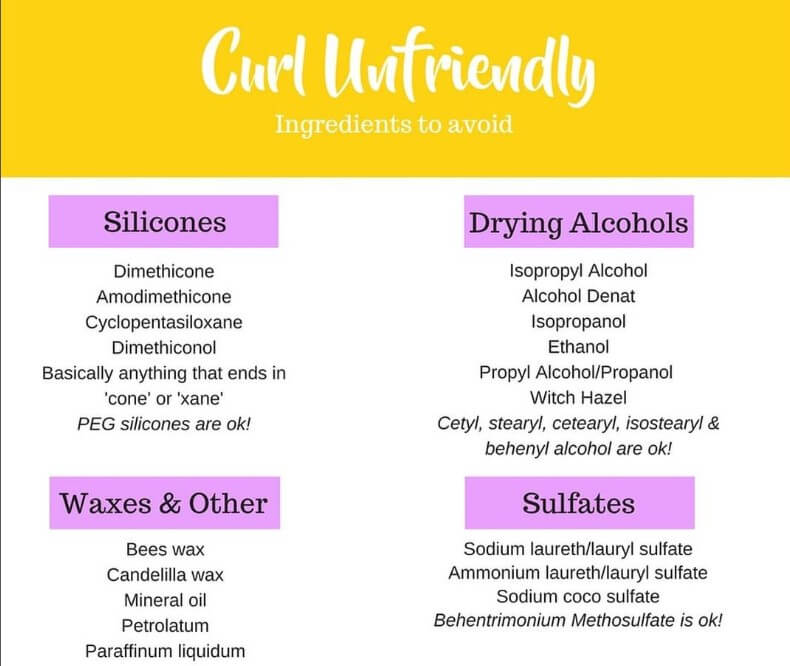
14. Dimethicone
Similar to silicones and cationic surfactants, dimethicone is also often found in conditioning agents.
Using dimethicone can help make the hair feel smooth and shiny because it coats each hair strand.
But this will cause a lot of residue to collect on the hair strands because dimethicone doesn’t wash off easily with water.
Over time it can coat the hair, weigh it down and can also block the pores on the scalp inhibiting sufficient moisture and nutrients to flow in and out of the hair follicles.
Words to look out for on product labels: Dimethicone, polydimethylsiloxane (PDMS).
What ingredients to avoid in shampoo for curly hair?
When choosing a shampoo for curly hair, it’s important to look for products that are specifically formulated to enhance and maintain the natural texture of your curls. Here are some ingredients to avoid in shampoos for curly hair:
- Sulfates: Sulfates are harsh detergents often found in shampoos that create a foaming lather. They can strip the hair of its natural oils, leaving it dry and frizzy. Look for sulfate-free shampoos or those with milder sulfate alternatives like sodium lauroyl sarcosinate or sodium cocoyl isethionate.
- Parabens: Parabens are preservatives commonly used in cosmetics and personal care products. They have been associated with potential health risks and may cause scalp irritation. Opt for paraben-free shampoos to minimize any potential adverse effects.
- Silicones: While not all silicones are bad for curly hair, certain types can build up on the hair over time and weigh it down, resulting in dullness and decreased curl definition. Avoid shampoos containing ingredients ending in “-cone” or “-siloxane” such as dimethicone or cyclopentasiloxane. If you prefer using silicones, choose water-soluble ones that are easier to rinse off.
- Alcohol: Look for shampoos that are free from drying alcohols like ethanol, isopropyl alcohol, and denatured alcohol. These can strip the hair of moisture and lead to dryness and frizz. Instead, opt for products that contain fatty alcohols like cetyl alcohol or stearyl alcohol, which can provide moisture and enhance curl definition.
- Fragrances: Artificial fragrances can contain potentially irritating chemicals that may cause dryness or scalp sensitivity. Choose shampoos with natural fragrances or those labeled as fragrance-free to minimize the risk of adverse reactions.
- Drying surfactants: Some surfactants, such as ammonium lauryl sulfate (ALS) or sodium lauryl sulfate (SLS), can be particularly drying for curly hair. Look for shampoos with gentle, moisturizing surfactants like coco-betaine or decyl glucoside.
Remember, everyone’s hair is unique, and what works for one person may not work for another. It’s essential to experiment and find the right combination of ingredients that suit your specific hair needs.
Non Toxic Shampoos Without These Harsh Ingredients
Here is a list of 10 non-toxic shampoos that are free from harsh ingredients:
- SheaMoisture Raw Shea Butter Moisture Retention Shampoo
- Acure Curiously Clarifying Shampoo
- Jessicurl Gentle Lather Shampoo
- Briogeo Be Gentle, Be Kind Avocado + Quinoa Co-Wash
- Innersense Hydrating Cream Hairbath
- Mielle Organics Babassu Oil Conditioning Sulfate-Free Shampoo
- Earth Mama Simply Non-Scents Baby Shampoo & Body Wash
- Desert Essence Coconut Shampoo
- Aunt Jackie’s Curls & Coils Oh So Clean Moisturizing & Softening Shampoo
- Giovanni 2chic Avocado & Olive Oil Ultra-Moist Shampoo
These shampoos are known for their gentle formulas that cater to curly hair needs while avoiding harsh ingredients such as sulfates, parabens, silicones, and drying alcohols. However, it’s always a good idea to check the ingredient list of each product to ensure they meet your specific requirements and preferences.
The final takeaway
If you have been buying commercial hair products all these years, make sure to go and check your product labels to check whether your currently used product contains these ingredients.
If they do, make sure to switch to another product that contains none of these ingredients or maybe simply choose the best way out – go in for an all-natural product that will not only work wonders for your hair, but will also actually take “care” of your hair.
Why You Should Trust Haireveryday?
The author of this article, Leah Marie Priest has a degree in Cosmetology with years of experience in dealing with hair care, scalp care, and hairstyling. As someone who extensively deals with all kinds of hair textures, products, styling methods and more, hair Leah Marie knows what kind of products and procedures suit each hair type and person. We have also tested these hair products and processes ourselves to provide you an unbiased review about every product. Each of our articles are also reviewed by a team of medical professionals so that you get the most accurate and expert-reviewed information.
Also Read:
Amazing Vegan Anti-Dandruff Shampoos
To Summarize

